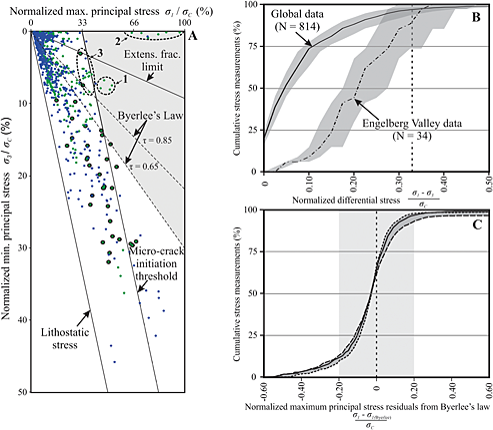stress-driven
Geohazard information for the masses
Category: Projects (page 5 of 5)

Predicted distribution of various types of fracture beneath an Alpine valley. Here we start with a ‘V’ shaped topography, introduce ice, and manually cut out the center of the valley. Fractures forming in tension and shear are coloured yellow and orange, respectively, while active ‘micro-cracking’ is purple, and regions in which we predict explosive fracturing are marked in red under the ice. Note how the area of explosive fracturing increases as we remove ice, and the difference in fracture distribution between model Stages 14 and 32, for which the only difference is the relief of stresses during the intermediate period of deglaciation (Leith et al. 2014).
Leith, K., Moore, J.R., Amann, F., Loew, S., 2014. Sub-glacial extensional fracture development and implications for Alpine valley evolution. J. Geophys. Res. 119, 62-81.

A revised compilation of in situ stress measurements indicates maximum differential stress magnitudes are limited by micro crack initiation.
Leith, K., Moore, J.R., Amann, F., Loew, S., 2014. In situ stress control on micro-crack generation and macroscopic extensional fracture in exhuming bedrock. J. Geophys. Res. 119, 594–615.
Candidate: Theresa Raab Supervisors: Kerry Leith, Michael Krautblatter Institution: Technical University of Munich Activity: Completed summer 2013
Read More...This PhD combines geomorphologic and engineering geological approaches to gain a better understanding of rock slopes and associated hazards posing a risk to life and key infrastructure. New insights are expected by integrating material mechanics, in particular stress corrosion, in the assessment of fracture propagation and, thus, instability of rock slopes. We assess conditioning processes […]
Read More...© 2026 stress-driven
Theme by Anders Noren — Up ↑

Recent Comments